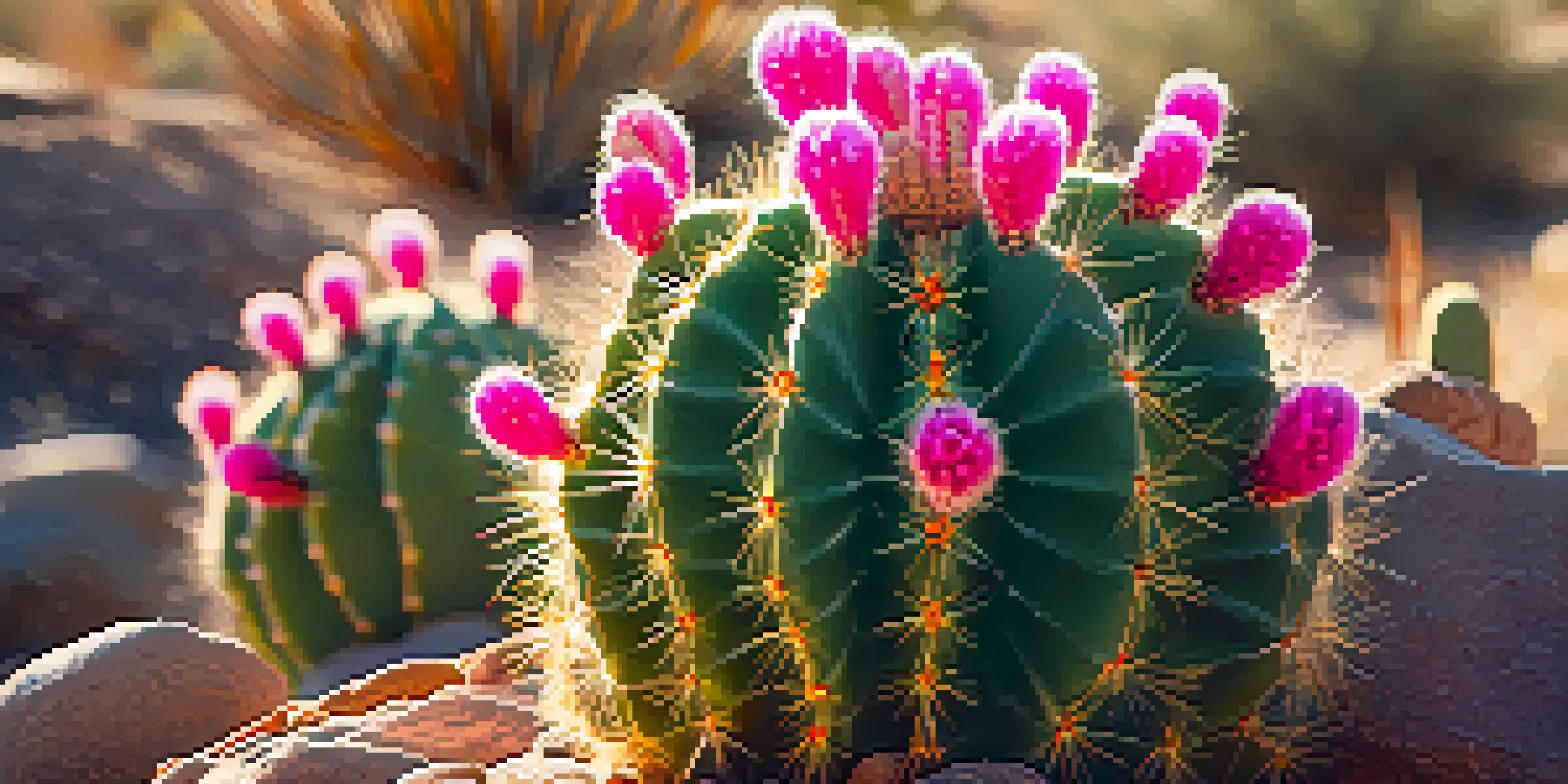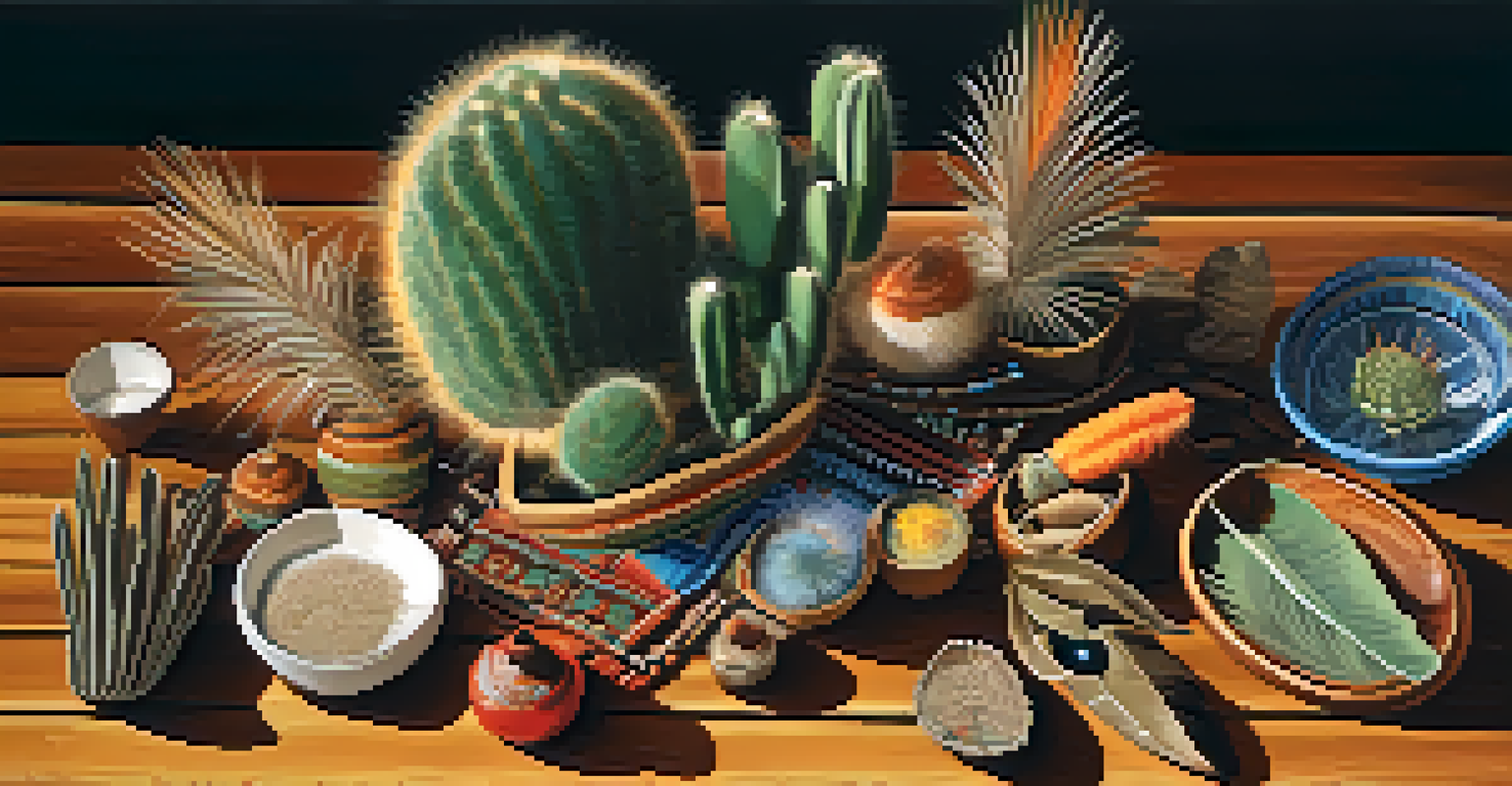Peyote as Medicine: Ethical Implications in Modern Use

Understanding Peyote: A Brief Overview of Its History
Peyote, a small cactus native to Mexico and the southwestern United States, has been used for thousands of years by Indigenous peoples for spiritual and medicinal purposes. Its psychoactive compound, mescaline, has drawn attention not just for its traditional use but also for potential therapeutic applications. Historically, Peyote was integral to the cultural and religious practices of various tribes, symbolizing a deep connection to nature and self-exploration.
Psychedelics can offer profound insights and healing when used responsibly.
In the early 20th century, Peyote began to attract interest from scientists and researchers who sought to understand its effects on the human psyche. This led to a resurgence in discussions around its use, particularly as modern medicine began to explore alternative therapies. However, the intersection of cultural significance and scientific curiosity raises important questions about respect and appropriation.
Today, while Peyote is still largely associated with Indigenous rituals, there is a growing interest in its psychoactive properties for mental health treatment. As we delve deeper into its medicinal potential, it’s crucial to acknowledge the traditional knowledge that Indigenous communities hold and the ethical implications of utilizing such sacred plants.
The Therapeutic Potential of Peyote in Modern Medicine
Recent studies have suggested that mescaline, the active compound in Peyote, may offer therapeutic benefits for conditions like anxiety, depression, and PTSD. Researchers are particularly interested in how psychedelics can facilitate emotional breakthroughs and enhance psychological resilience. This potential for healing has sparked a renewed conversation about integrating traditional plant medicines into contemporary therapeutic practices.

However, the path to acceptance is not straightforward. While some clinical trials have shown promising results, there remains a strong stigma surrounding psychedelic substances, which can hinder research and acceptance. Advocates argue that the therapeutic use of Peyote could provide alternatives for individuals who find little relief in conventional medications.
Peyote's Rich Cultural Significance
Peyote has been used by Indigenous peoples for spiritual and medicinal purposes for thousands of years, symbolizing a deep connection to nature.
Integrating Peyote into modern medicine requires a careful balance of scientific inquiry and respect for Indigenous practices. It’s vital to approach this integration with sensitivity, ensuring that the cultures from which these practices originate are honored and involved in the conversation.
Ethical Concerns: Cultural Appropriation and Misuse
As interest in Peyote grows, so do concerns about cultural appropriation, where elements of Indigenous culture are adopted without understanding or respect. This is particularly significant in the case of Peyote, as its use is deeply intertwined with the spiritual and cultural identities of Native American tribes. Misuse of Peyote in non-traditional contexts can lead to a commodification of sacred practices, eroding their meaning and significance.
Engaging Indigenous communities enriches our understanding and fosters respect for their traditions.
The term 'cultural appropriation' often ignites passionate discussions, highlighting the importance of acknowledging and respecting the origins of such practices. When non-Indigenous individuals use Peyote recreationally or as a trend, it not only disrespects the traditions but also risks the potential exploitation of Indigenous knowledge. It's crucial for those interested in Peyote to engage with Indigenous communities and seek guidance.
Moreover, the conversation around ethical use extends to the sustainability of Peyote itself. Overharvesting and habitat loss threaten this ancient plant, making it even more important to advocate for responsible and respectful practices that prioritize Indigenous stewardship of Peyote.
Legal Status of Peyote: A Complex Landscape
The legal status of Peyote varies widely, reflecting ongoing debates about its medicinal use and cultural significance. In the United States, Peyote is classified as a Schedule I controlled substance, which complicates research and its therapeutic application. However, certain exemptions exist for Indigenous religious practices, allowing for its use in specific ceremonial contexts.
This legal complexity raises questions about the rights of Indigenous peoples to access and utilize Peyote as part of their cultural heritage. The American Indian Religious Freedom Act (AIRFA) provides some protections, yet challenges remain regarding enforcement and recognition of tribal sovereignty. As discussions about medicinal use continue, the need for legal reform to better support Indigenous rights becomes increasingly evident.
Therapeutic Potential of Mescaline
Recent studies suggest that mescaline from Peyote may help treat mental health conditions like anxiety and PTSD, sparking interest in its integration into modern medicine.
Navigating the legal landscape requires a nuanced understanding of both the historical context and current implications. Advocates for Peyote's medicinal use must work alongside Indigenous leaders to ensure that any changes in legislation respect their rights and cultural practices.
Psychedelics and Mental Health: A Growing Movement
The rising interest in psychedelics for mental health treatment has sparked a movement that seeks to redefine how we view mental well-being. Peyote is part of this broader conversation, which includes substances like psilocybin and LSD. Advocates argue that these compounds can offer profound insights and healing when used responsibly, often within a therapeutic framework.
Many individuals report transformative experiences during psychedelic sessions, leading to increased self-awareness and emotional healing. This has prompted a wave of research aimed at understanding the mechanisms behind these experiences and how they can be harnessed for therapeutic benefit. As science catches up with traditional practices, there's an opportunity to bridge the gap between ancient wisdom and modern medicine.
However, it’s crucial that this movement emphasizes ethical considerations and respect for Indigenous cultures. As the conversation evolves, it must prioritize informed consent, safety, and the voices of those whose traditions have long embraced these practices.
Indigenous Voices: Centering Cultural Perspectives
In the ongoing dialogue about Peyote's medicinal use, it's vital to center Indigenous voices and perspectives. Indigenous communities possess a wealth of knowledge about the plant's uses, rituals, and the significance it holds within their cultures. Engaging these communities not only enriches our understanding but also fosters respect for their traditions.
Many Indigenous leaders advocate for the preservation of their cultural practices and the rightful use of Peyote within their communities. They emphasize the need for education and awareness among non-Indigenous individuals to prevent misuse and exploitation. By collaborating with Indigenous communities, researchers and advocates can ensure that any exploration of Peyote’s medicinal properties acknowledges and honors its cultural roots.
Ethical Research and Cultural Respect
Future research on Peyote must involve Indigenous communities to ensure ethical practices and honor the cultural significance of this sacred plant.
Furthermore, supporting Indigenous-led initiatives can empower these communities to maintain control over their resources and knowledge. This collaborative approach can cultivate a more ethical framework for exploring Peyote's potential, benefiting both Indigenous peoples and those seeking alternative healing methods.
Future Directions: Ethical Research in Peyote Studies
As interest in Peyote continues to grow, so does the need for ethical research practices that honor Indigenous cultures. Future studies should prioritize collaboration with Indigenous communities, ensuring their involvement in research design and implementation. This partnership can help create a framework that respects traditional knowledge while contributing to scientific understanding.
Moreover, establishing guidelines for the responsible use of Peyote in research settings is essential. This includes considerations around dosage, setting, and participant safety. Ethical research not only benefits scientific inquiry but also serves as a model for how to respectfully engage with sacred plants and the cultures that hold them dear.

Ultimately, the future of Peyote in medicine lies in a balanced approach that honors both its scientific potential and cultural significance. By fostering respectful dialogue and collaboration, we can pave the way for a deeper understanding of Peyote as a medicine and its rightful place in modern healing practices.